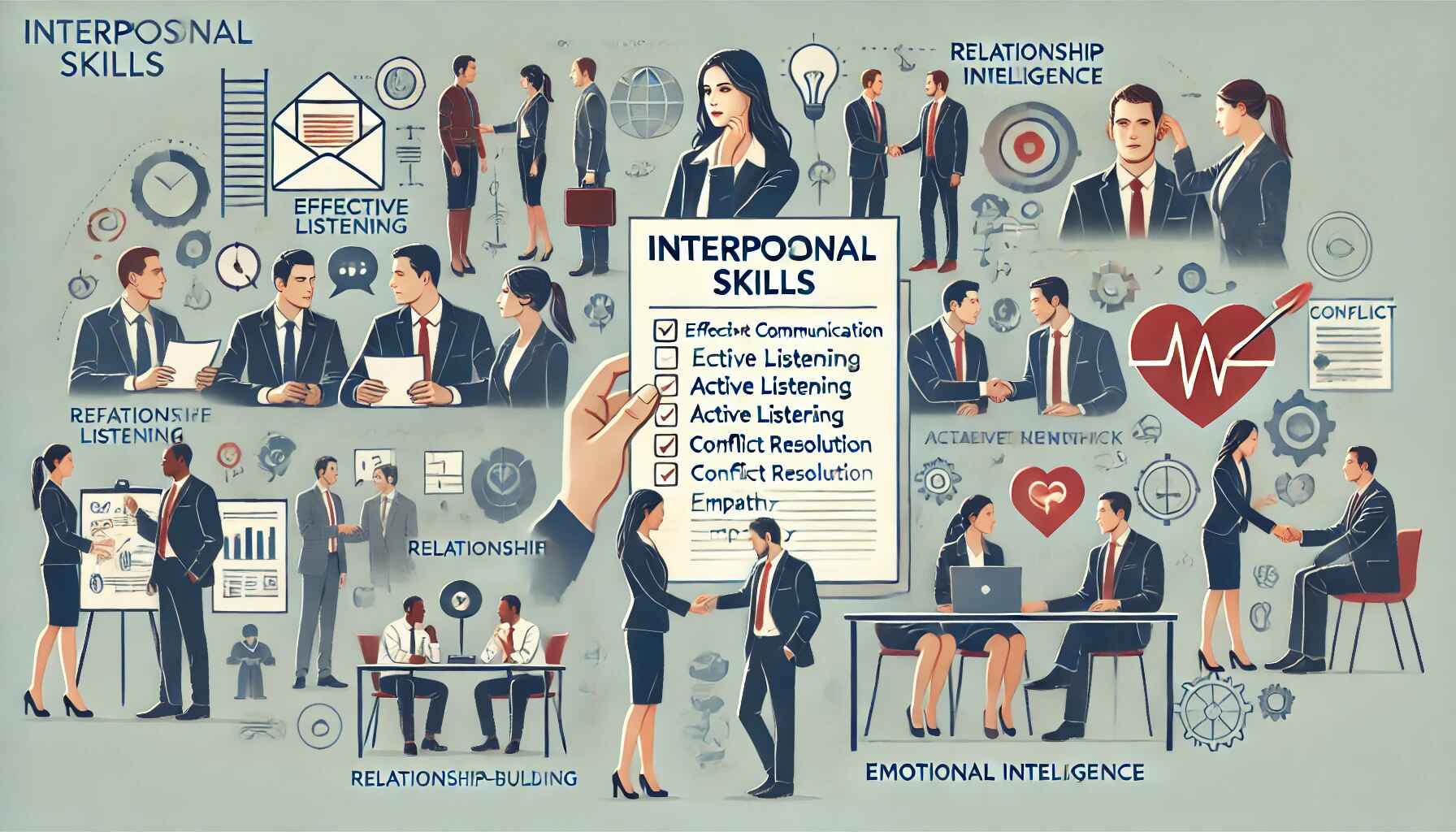What Are Interpersonal Skills? Definition & Examples
In the world of today, which is very speedy and linked, it is important for people to develop and improve their interpersonal skills even more. People usually call them people skills to create the most effective communication, typically in personal and professional life. This includes harmonious interactions with others, helping to establish connections to contribute to successful living.
What Are Interpersonal Skills?
Interpersonal skills encompass the very wide range of skills allowing individuals to communicate, interact, and work well with one another. These skills might include creating strong relationships, conflict resolution, or making mutually agreed goals. These are not like those technical skills which base their applicability depending on the job; interpersonal skills are applicable across all industries and for every job.
Some of the key components of interpersonal skills include:
Active Listening: The ability to fully concentrate on what others are saying, understanding their message without interruption.
Empathy: Recognizing and understanding the emotions and perspectives of others.
Verbal Communication: Expressing ideas and thoughts clearly and effectively.
Non-Verbal Communication: Using body language, facial expressions, and tone of voice to convey meaning.
Conflict Resolution: Managing disagreements constructively and finding solutions that satisfy all parties.
Teamwork: Collaborating with others to achieve a common goal.
Adaptability: Adjusting your behavior and communication style to suit different situations and individuals.
Why Are Interpersonal Skills Important?
Interpersonal skills are vital for building relationships, enhancing teamwork, and ensuring smooth communication. They are valued not only in personal relationships but also in professional settings. Employers increasingly seek candidates with strong interpersonal skills, as they contribute to a positive work environment and improved productivity.
Consider the following benefits:
Enhanced Collaboration: Teams with members who possess strong interpersonal skills tend to perform better, as communication flows smoothly and conflicts are minimized.
Improved Leadership: Leaders with strong interpersonal skills inspire trust and loyalty among their teams.
Career Growth: Employees with excellent interpersonal skills are often more likely to be promoted, as they can navigate workplace dynamics effectively.
Stronger Relationships: In personal life, these skills help in nurturing healthy relationships with family, friends, and partners.
Examples of Interpersonal Skills
Understanding interpersonal skills is only half the battle. To excel, it’s essential to practice and refine these abilities. Below are some practical examples and how they manifest in real-life scenarios:
1. Active Listening
Paying full attention to the speaker.
Avoiding distractions like mobile phones or multitasking.
Providing feedback by nodding or paraphrasing the speaker’s points.
2. Effective Communication
Speaking clearly and confidently.
Using simple and precise language to avoid misunderstandings.
Matching your tone and style to the context and audience.
3. Conflict Resolution
Addressing disagreements promptly and calmly.
Seeking a win-win solution rather than assigning blame.
Keeping emotions in check to avoid escalating the conflict.
4. Empathy
Putting yourself in others’ shoes to understand their feelings.
Acknowledging their emotions without judgment.
Using empathetic statements like, “I understand how you feel.”
5. Teamwork
Contributing your strengths to group projects.
Encouraging and valuing input from team members.
Sharing responsibilities and credit for successes.
6. Adaptability
Adjusting to new roles or responsibilities with ease.
Remaining open to feedback and learning opportunities.
Maintaining a positive attitude during times of change.
Developing Skills and Improving Interpersonal Skills
Improving interpersonal skills is a lifelong commitment that requires dedication and self-awareness. The following steps give an action plan one can use to improve these abilities:
1. Turn Up the Listening
Try to listen more than you speak. And try to understand the speaker's message even before making a judgment about it or giving any response.
2. Seek Feedback
Ask your colleagues, friends, or mentor for feedback about your interpersonal interactions. Take their comments to identify improvement areas.
3. Play Scenarios
Practice role plays covering different situations that occur that may include conflict resolution and chairing meetings. It builds up confidence and prepares you for real-life occurrences.
4. Read and Learn
Books and courses on the subjects of communication, emotional intelligence, and leadership will certainly provide insights and techniques you can use for improving your interpersonal skills.
5. Watch Other People
Keep an eye on people who would display great interpersonal skills. Investigate how they talk to others, settle disputes, and exist within teams, and incorporate their techniques into your own talking.
6. Stay Open-Minded
Go beyond other people's perspectives and ideas, and engage them for other reasons than diversity. Be willing to embrace diversity and learn from those differences.
Interpersonal Skills in the Workplace
Interpersonal skills are of prime importance for success in any profession. Some workplace applications include:
1. Relationship Building
Interpersonal skills are good tools for the building trust and rapport, whether dealing with employees, clients, or stakeholders.
2. Customer Service Management
With interpersonal skills, professionals can recognize the needs of their clients and proffer customized alternatives, resulting in increased satisfaction and loyalty.
3. Leadership Development
Leaders rely on interpersonal skills to motivate their teams, resolve conflicts, and create a positive work environment.
4. Conflict Management
In any diversity within the workplace, differences between people should be expected. Interpersonal skills guarantee constructive manipulative control over the conflict to sustain harmony and productivity.
Conclusion
In the current time, the value of interpersonal skills cannot be overshadowed; these skills smoothen personal relationship building, effective conversation, and career success. Through the development and management of these skills, individuals are able to unlock their full potential and have a positive impact on their personal and professional lives.









